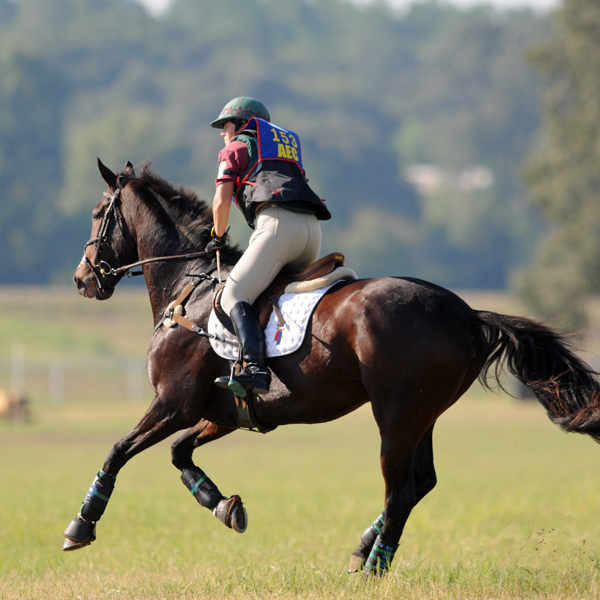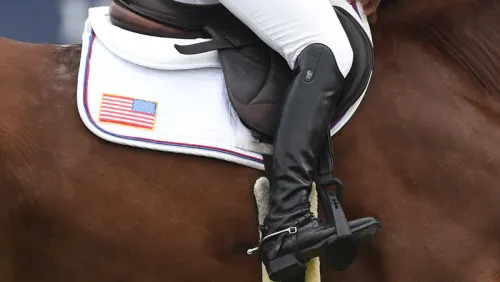When the Nutrena/U.S. Eventing Association American Eventing Championships moved to the Texas Rose Horse Park in Tyler this year for a three-year stint, after three years at Chattahoochee Hills (Ga.), many people questioned how accessible the event would be to most riders. More than half (60.28%) of the USEA’s 11,528 members live in the eastern third of the United States (Areas I, II, III and VIII), while 6.91 percent of members live in Area X and 21.95 percent are in Areas X, IX, IV and V combined. The remaining 16.98 percent of USEA members live on the West Coast, Areas VI and VII.
During the USEA’s Annual Meeting (Ohio), members also debated the move of The Chronicle of the Horse/USEA Adult Team Challenge, formerly a regional program with three competitions, to the AECs. Then it was mentioned that the AECs might have found a permanent home in Texas.
“The contract we signed is for three years,” said USEA CEO Jo Whitehouse. “If it is successful and everything works out and people come, we have the option to renew it and keep it there. We would like a permanent site and a permanent date, and the reason for that is every time the AECs move around, it causes great consternation in the area it lands in.
“From the very first one at the Carolina Horse Park [N.C.], to Lamplight [Ill.] to Chattahoochee Hills [Ga.], it has been sort of the elephant that sat on the calendar, and obviously the events leading up to it benefit because people are trying to qualify for the AECs, and then the events afterwards do get impacted, but people may be using those to qualify for the next year. It’s got to settle, and we’re trying to figure out how it can be of the least impact to anybody,” she continued.
At the 2013 AECs, 376 riders and 408 horses competed, and riders from 35 states attended. In 2012, 566 horses competed from 36 states, and 467 competed in 2011. This year marked the first time the USEA managed the competition instead of contracting out the management, and the USEA netted $21,000 from the event.
The decision isn’t finalized, and Whitehouse said it will be reviewed closer to the end of the contract.
ADVERTISEMENT
“Obviously it’s what our members are going to want that makes a difference,” she said.
Whitehouse said that the USEA has looked into other venues for the AECs, including the Kentucky Horse Park, which is difficult to book due to the numerous other shows throughout the year.
“There are very few sites in the country that can handle what we’re asking them to do—six levels of competition, championship courses, moving the Adult Team Challenge there,” she said. “The Texas Rose Horse Park, being in the middle of the country, does make it easier for both sides to get there. Obviously it’s not easy for those that have had it pretty much in the eastern half of the country the last 10 years, but what we’re trying to do is make it equitable for all.”
Carol Kozlowski, a past USEA board of governor member and upper level rider and a current member of the USEA’s Safety Committee and the Competitions And Rules Committee, sees the possibility of a permanent AEC location as a potentially negative move.
“Most adult amateurs that I know are not going to be able to afford to go,” she said. “And the thought that it’s never going to move is so disheartening. I understand why they want the venues that can handle 400 or 500 horses, of which there are not very many in this country, but they’re out there.
“Texas is not the demographic center of the country,” added Kozlowski, Geneseo, N.Y. “Everyone in the country has had the AECs in an area they couldn’t get to very well—knowing that it was probably going to move to a destination that was a little bit more feasible. The minute the ‘permanent’ came into the picture, I think that really upset a lot of people who see it forever being off their radar.”
ADVERTISEMENT
One of Kozlowski’s other concerns is the late September date, which she said was originally considered to give horses headed to the Dutta Corp Fair Hill International (Md.) a preparatory run, while also boosting entries from those upper level riders’ other horses and students. She cited the 2010 AECs at Chattahoochee Hills, which saw a record 647 entries, as an example, because it also hosted the Alltech FEI World Equestrian Games (Ky.) mandatory outing.
“I think going into Texas, the USEA knew they were going to struggle [with upper level entries], so they got that enormous sponsorship [of $40,000 for the advanced division], and that didn’t even do it,” she said of this year’s 13 advanced entries. “We’re seeing a trend. Now that Plantation [Field International (Pa.)] has the CICs the week before, people are going to stay in the Northeast with their upper level horses.”
Kozlowski also questioned the ATCs move to the AECs.
“Each rider can ride a horse in the AECs, and they can also ride [a different horse] on a team,” she explained. “I don’t know of a lot of adult amateurs that have two horses.
“There is not a huge polling of the masses, so my recommendation would be for these lower-level riders to start writing letters to your new president [Diane Pitts],” she added. “They’ve got to speak up, or everyone is going to assume that they’re OK with that decision.”















